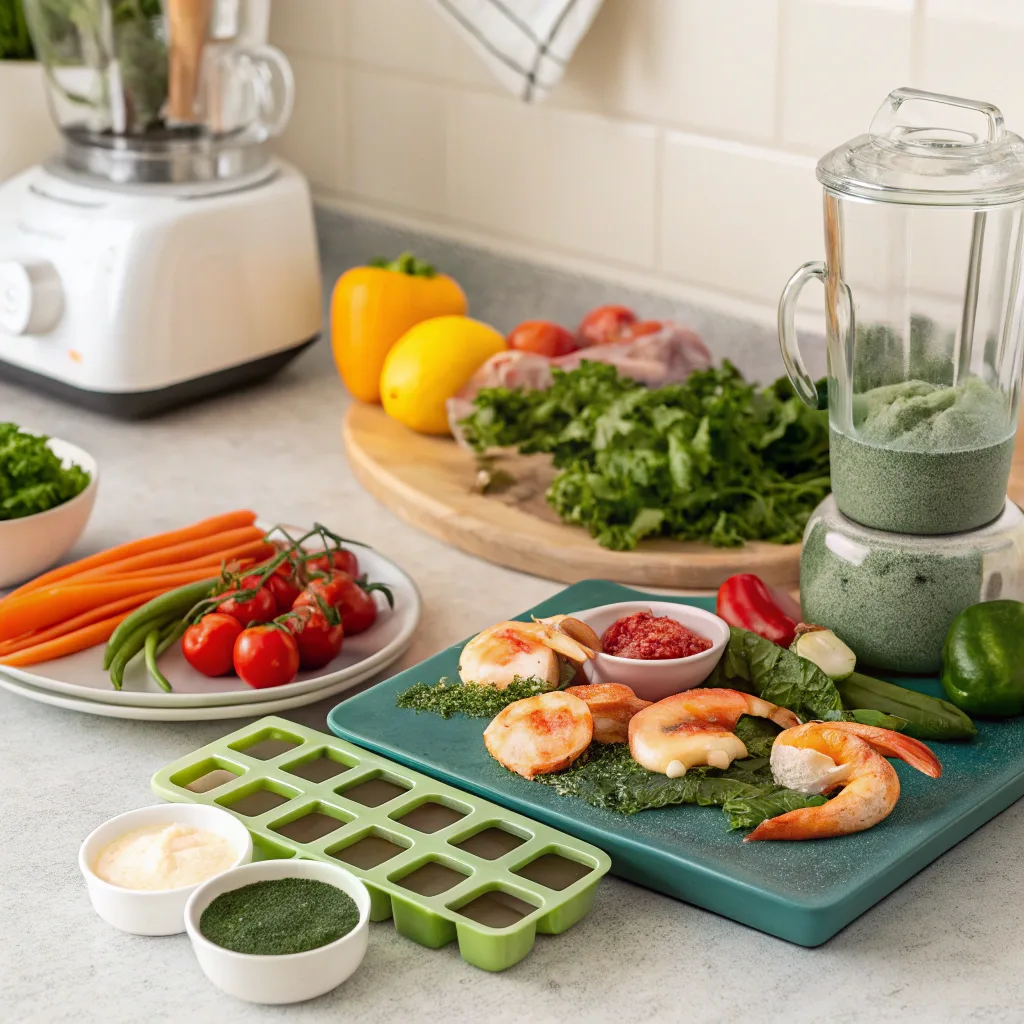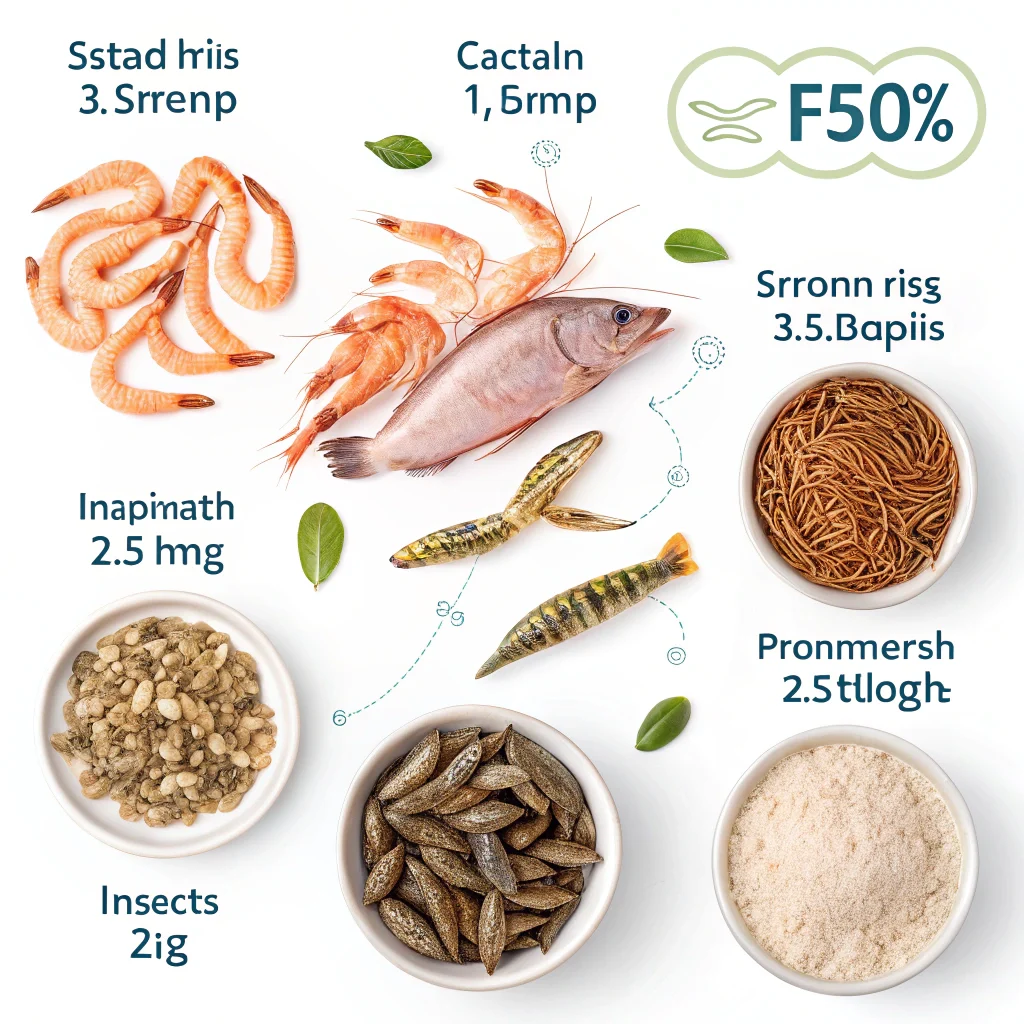Feeding your fish isn’t just about throwing pellets in the tank and calling it a day. It’s about understanding what goes into their food and how it affects their health. Whether you’re buying commercial food or whipping up something homemade, the right ingredients make all the difference. In this guide, we’ll discuss what are the best ingredients for fish food, covering the essential nutrients your fish need, the role of proteins, vegetables, and supplements, and even some easy homemade recipes. Let’s get started!
Understanding Fish Food Basics
Why Choosing the Right Ingredients Matters
The quality of fish food directly impacts the health and vitality of your aquatic pets. Poor-quality ingredients can lead to malnutrition, dull coloration, or even disease. On the other hand, using high-quality, nutrient-rich ingredients promotes growth, boosts immunity, and enhances the natural beauty of your fish.
Fish food should mimic their natural diet as closely as possible. For example, carnivorous fish need a diet rich in proteins like shrimp and bloodworms, while herbivorous species thrive on vegetables like spinach and kale. Selecting the right ingredients ensures your fish get everything they need to flourish.
Types of Fish Food: Commercial vs. Homemade
Commercial fish food is convenient, but it often contains fillers like corn or wheat that add bulk without much nutrition. On the other hand, making fish food at home allows you to control every ingredient. You can customize meals to fit the needs of your fish, whether they’re carnivores, herbivores, or omnivores.
While store-bought food can be a good baseline, homemade fish food offers the added benefit of freshness and flexibility. Plus, it’s a great way to bond with your fish and learn more about their dietary needs. Ready to dive deeper? In the next section, we’ll break down the essential nutrients that should be in every fish’s diet. Stay tuned!
Essential Nutrients for Fish
Proteins: Building Blocks of Growth
Proteins are the cornerstone of any fish diet, serving as the primary source of energy and aiding in muscle and tissue development. Carnivorous fish, such as bettas and cichlids, require protein-rich diets to thrive. Great protein sources include:
- Fish meal: A common ingredient in commercial food, packed with essential amino acids.
- Shrimp and bloodworms: Perfect for variety and added nutrition.
- Beef heart or scallops: High in protein but should be fed in moderation.
Fats and Lipids for Energy
Fats play a crucial role in providing energy and supporting cell function. Healthy sources of fats include:
- Fish oil: Rich in omega-3 fatty acids that enhance immunity and promote vibrant colors.
- Flaxseed oil: A plant-based alternative that’s equally beneficial.
Overfeeding fats can harm your fish, so it’s essential to find the right balance in their diet.
Carbohydrates: Small but Important
While fish don’t rely heavily on carbohydrates, they still benefit from small amounts for energy. Vegetables such as spinach, carrots, and peas provide a natural source of carbs, along with essential fiber to aid digestion.
By focusing on these core nutrients, you’ll create a balanced and nutritious diet for your fish. Wondering what are the best ingredients for fish food? The right mix of proteins, fats, and carbohydrates makes all the difference.
Protein-Rich Ingredients for Fish Food
Animal-Based Proteins
Animal-based proteins are critical for carnivorous fish. They mimic the natural diet of fish in the wild, providing nutrients that promote growth and activity. Key ingredients include:
- Fish meal: This is a staple in both commercial and homemade fish food. It’s derived from whole fish or trimmings and is nutrient-dense.
- Shrimp and krill: Not only are these rich in protein, but they also enhance the coloration of ornamental fish.
- Beef heart and chicken liver: High-protein options that should be used sparingly to avoid excess fat.
Plant-Based Proteins
Plant-based proteins cater to herbivorous and omnivorous fish. These ingredients ensure a healthy mix of amino acids without relying entirely on animal sources:
- Spirulina: This blue-green algae is a superfood, boosting immunity and vibrant coloration.
- Nori sheets: Commonly used in sushi, these seaweed sheets are excellent for herbivores like plecos.
- Soy protein or pea protein: Sustainable and easy-to-digest alternatives to animal-based proteins.
Including a mix of these protein sources in your fish food guarantees a nutritious diet. So, what are the best ingredients for fish food? It all starts with quality proteins tailored to your fish’s natural dietary needs. Ready to dive into plant-based options? Stay tuned for the next section!
Vegetables and Plant-Based Ingredients
Leafy Greens: A Vital Component
Vegetables play a crucial role in creating balanced fish food, especially for herbivorous and omnivorous species. Leafy greens, in particular, are packed with fiber, vitamins, and minerals that support digestion and overall health. Some of the best options include:
- Spinach and Kale: These greens are easy to digest and rich in iron and calcium, which are essential for strong bones and vibrant colors.
- Zucchini and Lettuce: Zucchini is a soft vegetable that fish love to nibble on, while lettuce provides a mild flavor they enjoy.
These vegetables are easy to prepare and can be steamed or fed raw, depending on your fish’s preferences.
Root Vegetables and Others
Root vegetables and other plant-based options add variety to your fish food. These ingredients not only offer essential nutrients but also mimic the natural diet of herbivorous species. Consider these options:
- Carrots: Rich in beta-carotene, which enhances fish coloration.
- Sweet Potatoes: Provide a natural source of carbohydrates for energy.
- Peas: High in fiber, peas help improve digestion and prevent bloating in fish like goldfish.
If you’re asking what are the best ingredients for fish food, incorporating a mix of leafy greens and root vegetables is key. For more inspiration on plant-based recipes, check out this guide on homemade fish food.
Additives and Supplements for Better Nutrition
Spirulina and Garlic for Immune Support
Additives and supplements can elevate the nutritional value of fish food, giving your aquatic pets a boost in health and vitality. Two standout options include:
- Spirulina Powder: This algae-based supplement is a superfood for fish. It’s loaded with antioxidants and promotes a healthy immune system, vibrant colors, and overall well-being.
- Garlic Extract: Known for its antiparasitic properties, garlic also enhances the taste of fish food, making it more appealing to picky eaters.
Vitamins and Minerals
While fresh ingredients provide many nutrients, supplements ensure your fish get a complete diet. Consider adding:
- Multivitamin Powders: These provide essential vitamins like A, C, and D for growth and immunity.
- Calcium and Phosphorus: Found in fish oil capsules or specialized powders, these minerals strengthen bones and scales.
By including these additives, you can answer the question what are the best ingredients for fish food with confidence, ensuring your fish thrive in a balanced and nutritious environment. Want more recipes featuring these ingredients? Don’t miss this helpful fish food recipe guide.
Homemade Recipes for Fish Food
Gel-Based Recipe for Tropical Fish
Gel-based fish food is a versatile option that works well for tropical fish like tetras and guppies. This recipe combines fresh ingredients with a gelatin binder, making it easy to portion and store.
- Ingredients:
- 1 cup of chopped shrimp or fish fillets
- 1/2 cup of steamed spinach
- 1/2 cup of carrots (lightly steamed)
- 1 tablespoon of spirulina powder
- 1 packet of unflavored gelatin
- Instructions:
Blend all ingredients (except gelatin) into a smooth paste. Dissolve gelatin in warm water and mix with the paste. Pour the mixture into ice cube trays and freeze. Defrost one cube at a time for feeding.
Protein-Packed Recipe for Carnivorous Fish
Carnivorous fish thrive on high-protein diets. This recipe mimics their natural diet while keeping it fresh and nutritious.
- Ingredients:
- 1 cup of raw fish fillets
- 1/2 cup of bloodworms or krill
- 1 tablespoon of garlic extract
- A pinch of vitamin powder
- Instructions:
Blend all ingredients into a paste. Portion the mixture into small molds and freeze. Thaw a portion before feeding, and serve in small amounts to prevent overfeeding.
Vegetable Blend Recipe for Herbivorous Fish
Herbivorous fish need a mix of leafy greens and plant-based proteins. This recipe is ideal for species like plecos and goldfish.
- Ingredients:
- 1 cup of steamed zucchini
- 1/2 cup of peas (shelled and steamed)
- 1/4 cup of nori sheets
- 1 tablespoon of spirulina powder
- Instructions:
Blend all ingredients until smooth. Freeze the mixture in trays, and serve one cube per feeding session.
If you’ve been asking, what are the best ingredients for fish food?, these recipes provide the perfect answer, combining freshness and nutrition tailored to your fish’s needs.
FAQs About Fish Food Ingredients
Can All Fish Eat the Same Ingredients?
No, not all fish can eat the same ingredients. Carnivorous fish need protein-rich diets, while herbivorous fish thrive on plant-based meals. Omnivorous fish require a balance of both. It’s important to tailor your fish food to their specific dietary needs. Including the wrong ingredients can lead to malnutrition or even harm your fish.
What Ingredients Should Be Avoided?
Some ingredients are harmful to fish and should never be included in their diet. Avoid fatty cuts of meat, heavily processed foods, and items with salt, sugar, or preservatives. For example:
- Onions and garlic in large quantities can be toxic.
- Raw poultry or beef carries bacteria that can upset digestion.
For those asking, what are the best ingredients for fish food?, always stick to fresh, natural options and double-check the safety of new additions.
How Do I Balance Ingredients in Fish Food?
The key to a balanced diet is variety. Combine proteins, vegetables, and supplements in appropriate ratios. For most species, a mix of 40% protein, 30% vegetables, and 30% additives or binders works well.
Conclusion and Final Tips
Choosing the Best Ingredients for Fish Food
Selecting the right ingredients is crucial to keeping your fish healthy and active. By focusing on fresh proteins, vibrant vegetables, and beneficial supplements, you can craft meals that mimic their natural diet. For anyone asking what are the best ingredients for fish food, the answer lies in variety and balance. Tailor your recipes to suit your fish’s needs, whether they’re herbivores, carnivores, or omnivores.
Encouraging Experimentation and Variety
Don’t hesitate to try new combinations of ingredients or tweak existing recipes. Every fish species is unique, and experimenting with their food is a rewarding way to keep them thriving. Just remember to watch how they respond and adjust as needed.
Additional Resources and Next Steps
Where to Learn More About Fish Nutrition
Understanding what are the best ingredients for fish food is only the beginning. For deeper insights, explore online guides, aquarium forums, or books on fishkeeping. Resources like Recipes Smart offer detailed advice on crafting homemade fish food and balancing nutrients for different species.
Final Tips for Success
- Keep It Fresh: Always use fresh ingredients for maximum nutritional value. Frozen or dried alternatives can work in a pinch but lack the same benefits.
- Start Simple: Begin with a basic recipe and gradually introduce new ingredients to monitor your fish’s reaction.
- Stay Consistent: Feed your fish at the same time daily and maintain a balanced diet to avoid overfeeding or malnutrition.
Experimenting with homemade fish food is a fun and effective way to care for your pets. With the right mix of proteins, vegetables, and supplements, you’ll provide them with everything they need to thrive. Would you like help creating more recipes or finding advanced resources? Let me know!


